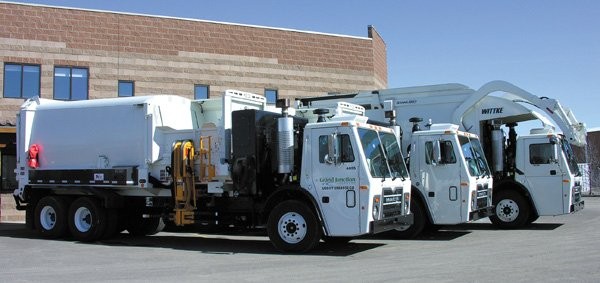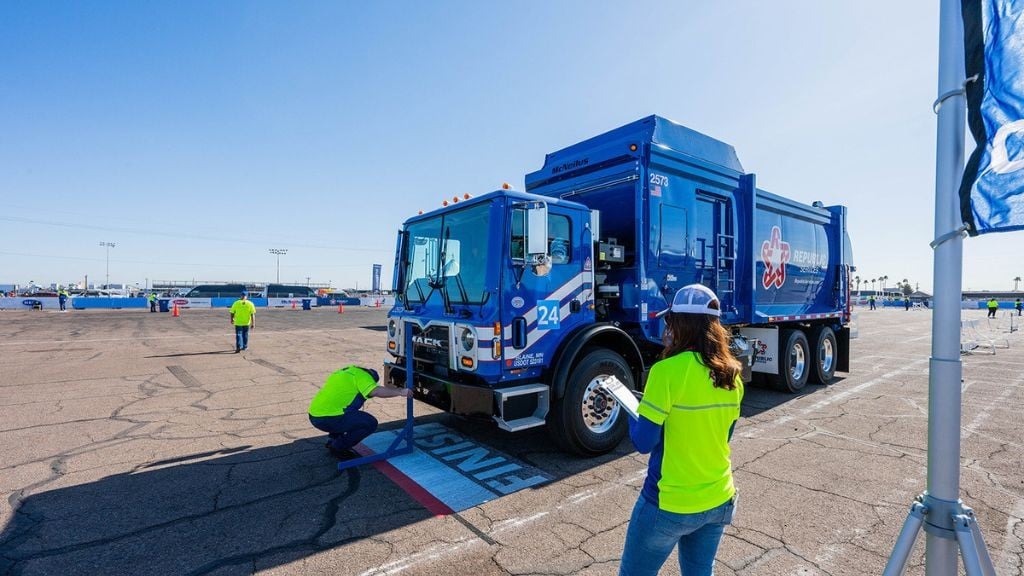Natural gas power
IESI turns to natural gas to fight back against the high cost of diesel

The alternatives to using diesel fuel for waste and recycling haul and collection fleets have grown steadily over the last decade. Compressed natural gas, liquefied natural gas, electric, biofuels such as Dimethyl Ether, and hybrid and hydraulic technologies are all now more feasible economically than ever before.
As with all new technologies however, the switch to an alternative fuel such as compressed natural gas (CNG) comes with some higher related costs. The fuel itself isn’t necessarily more expensive – in fact it’s currently lower. But there is infrastructure required such as fueling stations, as well as revised maintenance facilities and technology. Plus, trucks compatible to run on fuels other than diesel are generally more expensive up front. But when the comparatively high cost of diesel fuel is considered over the long term, along with other diesel fuel factors such as safety, sustainability, dependance on foreign markets, etc., alternative fuels just keep looking better and better.
According to Curtis Dorwart, Mack vocational products marketing manager; “Among the challenges [of making the switch to CNG] are getting the domicile site ready to fuel the trucks, and then maintaining them. It is usually not practical to rely on an external source to fuel the trucks, so customers must decide what sort of fuel station works for their operations. Cost and maintenance of the station are key considerations, and service technician training also needs to be addressed.”
“Converting does require preparation and investment,” continues Dorwart. “The cost of the fueling station(s) and associated maintenance, as well as necessary changes in driver and service personnel behaviour, are sometimes overlooked.”
“The number of stations has increased over the past few years, and serious efforts are underway to add more – both public and private,” says Dorwart.
“It is important to note that some of the stations are not readily accessible to heavy-duty vehicles, or do not have enough islands to fuel numerous vehicles at the same time. Cycle time required to fill the onboard storage tanks can also be slower than with diesel.”
This, says Dorwart, reinforces the practicality of installing a proprietary, dedicated fueling station versus relying on a commercial site. And he says, it is even more practical when one considers that once a company has their own fueling station, trucks are coming home every night. He adds; “The natural gas option for the Mack TerraPro really does not limit available specifications.”
“In some cases, there are actually more options. The list of standard and optional equipment is quite comprehensive, including things like air conditioning, horizontal exhaust, Allison 3000 and 4000 series transmissions, and various rear axles and suspensions. Everything that makes a Mack TerraPro right for the job is available in a natural gas-powered version.”
IESI’s CNG fleet
In 2010, Independent Environmental Services Inc. (IESI) decided to do something about the high costs of using diesel for their fleet. IESI is part of Canadian-based IESI-BFC Ltd., who recently announced a corporate name-change to Progressive Waste Solutions (www.bficanada.com). The company is currently the third largest non-hazardous solid waste management company in North America, with 2010 revenues of over $1.4 billion.
In 2010, IESI acquired a 2010 Mack TerraPro model powered by a Cummins ISL-G CNG engine. They began testing the rear-loader in two suburbs of the Dallas-Fort Worth metro area. The results were stellar.
“We are spending about 20 percent less for the CNG vehicle on an hourly basis than an equivalent diesel truck – and that’s before we take any federal credits,” says John Gustafson, Texas regional Vice President of IESI.
Gustafson said the company tested the CNG truck largely because natural gas is a domestic fuel that counters volatile diesel prices. After running the trucks, he says the cleaner-burning fuel is also paying off in that it is finding greater acceptance among the 350 environmentally conscious municipalities IESI serves.
“IESI-BFC has always been a very forward-thinking company,” adds David Carroum, sales representative for East Texas Mack Sales in Dallas. “But with the purchase of a Mack TerraPro, they proved that they are willing to do the right thing for the environment without any political or regulatory pressure.”
“We’re excited about the results,” Gustafson says. “We see natural gas as something that our customer base is very interested in. If the testing of the trucks in heavier-duty applications is positive, we anticipate expanding the use of these natural gas vehicles.”
Carroum believes IESI will purchase additional CNG-powered trucks from Mack but for reasons that go beyond fuel savings.
“Innovators,” he said, “choose to do business with other innovators.”
Definitely, Mack is no stranger to the IESI-BFC fleet. Of the 2,000 trucks the company runs throughout North America, about 80 percent are Mack models. East Texas Mack has sold IESI about 200 trucks in the last two years and expects to sell another 100 trucks this year. Texas operations include 1,200 employees and franchises that serve 250 cities. In Canada, according to Dorwart, Mack has natural gas powered units running in both Toronto and in Surrey, B.C.
“The population of trucks in Canada is smaller, but my understanding is that the Canadian experience to date has been quite similar to the experience in the U.S.”



